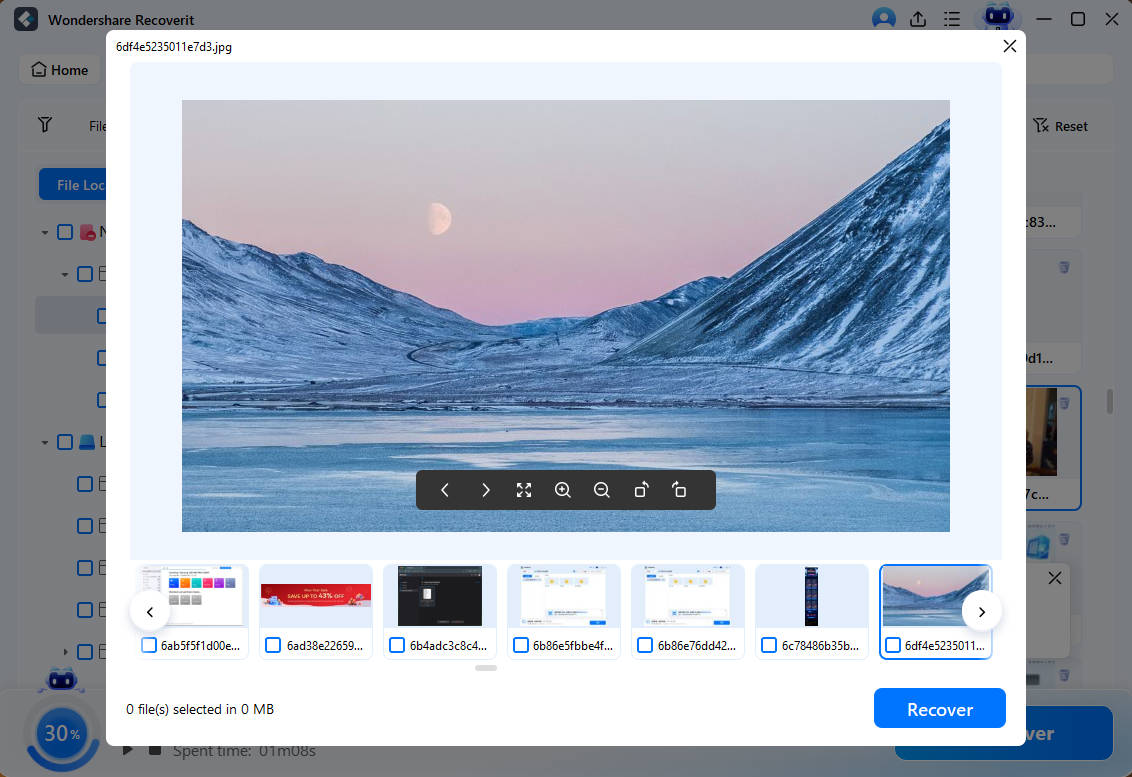You likely keep all your favorite photos directly on your phone or digital camera for easy access. However, while doing so, a simple thing such as a data transfer interruption or a software bug could accidentally erase all your cherished memories.
Still, all isn't lost, even in this instance. Software like CardRecovery might just be able to get your files back, but is it as powerful as it seems? Check out this comprehensive CardRecovery review to find out if this is the solution for you or if you need a better alternative.
In this article
Overview: CardRecovery
CardRecovery is a multimedia data recovery solution that works with most memory cards commonly used for phones and digital cameras. First introduced well over a decade ago, it's accumulated thousands of loyal users and gained quite a decent reputation.
It comes with comprehensive support for various storage devices, including:
- Secure digital cards;
- SD cards;
- SDHC;
- miniSD;
- MicroSD;
- Compact flash cards;
- MicroDrives;
- Memory sticks;
- Multimedia cards;
- USB flash drives;
- Thumb drives;
- XQD cards;
- Mobile phone memory cards, etc.
Moreover, it can be used for virtually any brand of phone or camera, from Nikon and Cannon to FujiFilm, Samsung, Panasonic, and Polaroid. However, while it works well with Android and even Blackberry phones, it offers no support for Apple devices.
You can use CardRecovery to retrieve lost photos, videos, and audio files of the most common formats. Supported photo file formats include JPG, JPEG, and TIFF, while supported video formats include MP4, MOV, AVI, MPG, MPEG, ASF, 3GP, and MTS. As far as audio files are concerned, the supported types are WAV, MP3, and AMR.
Depending on your device, you can even rely on CardRecovery to retrieve RAW images. This option is available with Nikon NEF, Canon CRW/CR2/CR3, and Kodak DCR, to name a few.

However, the data loss scenarios it works in are somewhat limited. It only works with accidental and intentional file deletion, formatting, memory card errors, and data corruption.
Main Features of CardRecovery
CardRecovery is a relatively simple solution that's somewhat light on features. It doesn't have many of the bells and whistles that most novel data recovery solutions offer. Designed to do nothing more than recover your multimedia files, it can:
- Recover deleted photos/videos – works in accidental and intentional data deletion scenarios;
- Recover lost photos – retrieves photos that were lost due to formatting or “delete all” operations;
- Recover from formatted devices – retrieves photo, video, and audio files from storage devices that were formatted;
- Recover from unreadable memory cards – retrieves files from memory cards that have file system or formatting errors;
- Recover from mobile phones – retrieves photos, videos, and audio from Android and Blackberry memory cards;
- Smart scan – uses technology developed by WinRecovery Software to uncover lost data.
Despite its limited features and capabilities, CardRecovery can be valuable in the most common data loss scenarios. However, considering that you must pay to use it, the lack of more advanced features is quite a disadvantage.
CardRecovery Performance
One of the most important specs when choosing the right data recovery software for you is its speed and overall performance.
CardRecovery boasts decent speeds, though certainly not the best. On average, it takes the tool about three minutes to scan a 1 GB SanDisk SD card. Scanning an 8GB card takes about 15 minutes. If you have a larger card of 64GB or more, be prepared to invest over two hours just to scan it.
Therefore, patience will certainly be a virtue if you decide to use this tool.

CardRecovery Pricing Information
If you're interested in trying CardRecovery, make sure you have enough money on your card. Unfortunately, the tool has no free version, but you can check it out with a free trial.
The good news is that there are no monthly subscriptions or any recurring fees. You only have to pay a one-time fee of $39.95, and you'll get the tool for life. You'll also get free technical support and free 2-year upgrades.

As soon as you order CardRecovery and pay for it, you'll receive its download Image name and your registration key via email.
CardRecovery User Comments
CardRecovery has a mixed bag of reviews. While some users are astonished that the tool has helped them retrieve some of their most important photos and videos, others are dissatisfied with its lack of features and recovery capabilities.
Here's a glimpse into what users are saying about CardRecovery on different platforms:
| Positive reviews | Negative reviews |
| “There were many very important files in my SD card. However, my SD card crashed and all the files were lost one day. I was very upset about this. I have tried many methods to restore my files . Only Cardrecovery helps me do that and all my files are restored. Many thanks.” – Ela on Trustpilot | “[...] After purchasing the full license and running the software on my corrupt Lexar Memory Pro Duo stick, the result was 230 mts files. The recovered files were numbered from 1 - 230 in this format File0001.MTS - File0230.MTS. Unfortunately, the files that can be played back are totally out of sync. Audio does not match video. This software was a complete waste of time and money for me. [...]” – shirgles on CNET |
| “My SD card crashed down with some reasons. All the data in it was lost including much very important data. I was sad about it. However, Cardrecovery helps me restore all of them. Thanks.” – Annie on Trustpilot | “[...] It shows that i can recover 721 files, so I bought the registration, but none of the file it recover work!!!!!!!!!!! I WANT MY MONEY BACK [...]” – dom_boonen on CNET |
| “[...] I was able to recover 1100 photos from by brothers Disney trip. Worth the $40. Just wish I didn't have to pay until i knew it recovered the files.” – ender218 on CNET | “recovered some files not worked for large files deleted or damaged waste money, disappointing” – george-sk on CNET |
Overall, though CardRecovery seems to be effective for some users, others cannot recover the files they want or struggle with the recovered file quality. You should remember these when determining whether this tool is right for you.
Final Verdict: Pros & Cons of CardRecovery
If you aren't sure whether CardRecovery is the right choice for you, here's a look into its main advantages and disadvantages that might help you decide.
While it's not the best data recovery solution, CardRecovery could effectively retrieve some of your most important images, videos, and audio files. Still, there are far better and more reliable solutions out there that could do much more, so you'll need to choose carefully.
How to Use CardRecovery
If you're interested in giving CardRecovery a try, you'd be happy to learn that it's relatively easy to use. It boasts a wizard-style interface, so you'll just have to follow a few simple steps to retrieve your files:
- Download and install CardRecovery on your PC;
- Connect your camera/storage device to your PC;
- In CardRecovery, select the drive you want to scan, along with the file type and destination folder;

- When the scan is complete, preview your files;

- Select the ones you want to recover, click Next, and recover them.
You'll be able to find your recovered files in the destination folder you've selected.
A More Versatile Alternative - Wondershare Recoverit
While CardRecovery can be effective for some users, it's seriously lacking in a few departments. It comes with no iOS support. Its scan is quite slow. It has no free version. It doesn't support many data loss scenarios. There are countless other more reliable solutions that cover all these bases, and among them is Wondershare Recoverit.
Lauded for its efficiency and powerful performance, Wondershare Recoverit can take the job that CardRecovery offers. You can recover your vital data from SD cards, memory cards, USBs using Wondershare Recoverit.
Here is a guide for SD card recovery with Recoverit. You can see how smooth and easy the recovery process is.
In addition, Recoverit comes with a functional free trial version. Here's a brief overview of the differences between CardRecovery and Wondershare Recoverit:
| Features and capabilities | CardRecovery | Wondershare Recoverit |
| Storage devices supported | Most phone and digital camera cards
SD cards Memory sticks USBs | All digital camera cards
SD cards Memory cards USBs HDD SSD |
| Data loss scenarios supported | Accidental and intentional file deletion, formatting, memory card errors, and data corruption; | Accidental and intentional file deletion, formatting, memory card errors, data corruption, software crashes, malware infestation, unknown error codes, etc. |
| File types supported | JPG, JPEG, TIFF, MP4, MOV, AVI, MPG, MPEG, ASF, 3GP, MTS, WAV, MP3, and AMR; | JPG, JPEG, TIFF, MP4, MOV, AVI, MPG, MPEG, ASF, 3GP, MTS, WAV, MP3, AMR, PNG, BMP, 3GP, DOC/DOCX, PPT/PPTX, and 1000+ more; |
| Enhanced recovery | ❌ | ✅ |
| Crashed system recovery | ❌ | ✅ |
| Operating system | Windows | Windows, Mac, Linux |
Despite offering more features and capabilities than CardRecovery, Wondershare Recoverit remains easy to use thanks to its intuitive interface and streamlined design.
To recover your image, video, audio, document, and other file types with Wondershare Recoverit, you'll have to follow a few easy steps:
- Download and install Wondershare Recoverit to your computer;
- Connect your external storage device to your computer and launch Wondershare Recoverit;
- Select your external storage device to start scanning it;

- Wait for the all-around scan to finish;
- Preview the files available for recovery;

- Click Recover to save your files.
 Note: As always, it's in your best interest to save your recovered files in a location different from the original storage device. Otherwise, you could risk overwriting other lost/deleted files on the device and losing them for good.
Note: As always, it's in your best interest to save your recovered files in a location different from the original storage device. Otherwise, you could risk overwriting other lost/deleted files on the device and losing them for good.
Conclusion
Whether you go with CardRecovery or Wondershare Recoverit, you can rest easy knowing that your files aren't always lost forever, even after deletion or quick formatting. With the right tool, you can retrieve your photo, video, audio, or other file type without much fuss and then back them up on time to avoid this scenario happening again.















